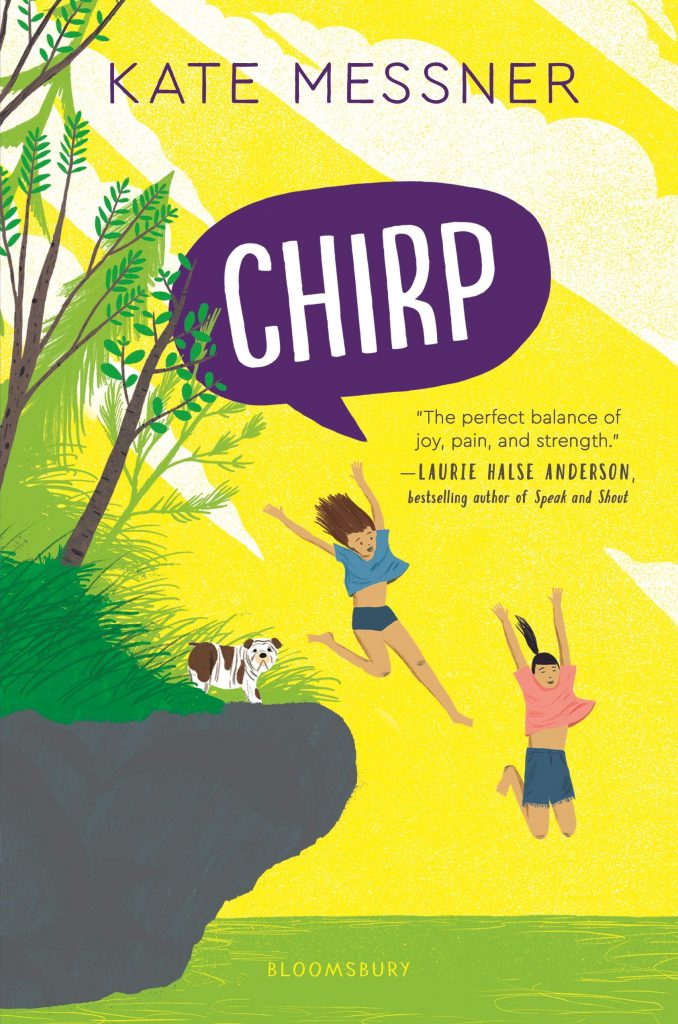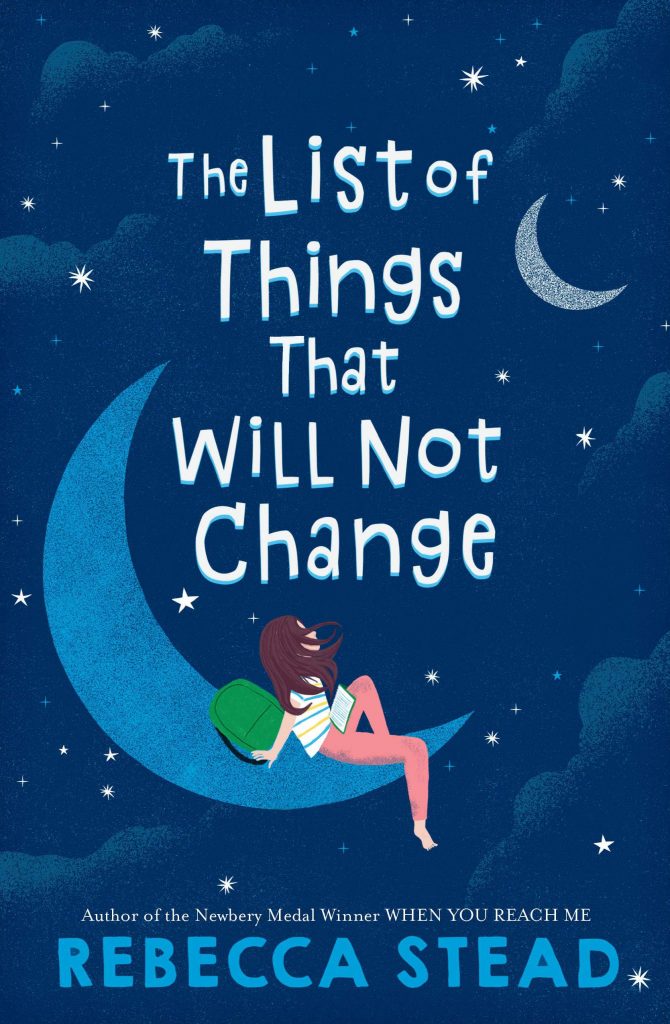We’re continuing our annual “Newbery Buzz” series today with round #2 for 2021. (We discussed King and the Dragonflies earlier this month.) As a reminder, we do not know which books the actual Newbery committee is seriously considering; we discuss books we’ve been hearing lots of “buzz” about in the children’s literature channels and try to determine if the book might have a shot.
Today we (Janie and Betsy) are going to challenge ourselves by working two books into one post! They’re not that similar in theme, but very similar in style, target age range, and contemporary relevance. The first is Chirp, by Kate Messner. Janie will start by summarizing the plot:


Janie: Mia’s family has moved from Boston to Vermont, and though she’ll miss her friends from middle school, she’s not entirely unhappy about it. They’ll be close to Gram–a woman Mia loves and admires as a trailblazer, academic, and entrepreneur. But there are other reasons Mia is ready to leave Boston. Her parents don’t know why she’s lost her her enthusiasm for gymnastics. It goes beyond a broken arm from falling off a balance beam, but the “beyond” is something she doesn’t even want to think about, much less talk about. Meanwhile, Gram is struggling with her latest business: raising crickets. For food. A surprising number of people are eager to try her barbecue and chocolate dip varieties, but she thinks someone is trying to sabotage the business. The developing mystery draws in Mia and two new friends, but there’s a deeper subtext. Could you tell us what that is, Betsy?
Betsy: Sure, Janie. Mia’s mother signed Mia up for two summer camps: a Ninja Warrior camp (styled after the popular TV shows) and a young entrepreneur camp. To get to the Ninja Warrior camp each day, Mia must walk past a gym and the gymnastics training in process. Thanks to her perceptive teachers, Mia learns to face her physical fears at Ninja Warrior camp, progressing through various levels of obstacles. The young entrepreneur camp helps Mia face her emotional insecurities related to speaking up and standing up for herself. But it’s not until she attends a seminar led by a young businesswoman that Mia starts to connect the dots. As the young businesswoman describes the harassment she’s faced in the workplace because she’s a woman, Mia thinks “me too.” Perceptive adult readers will long have figured out that Mia’s secret and her insecurities relate to a #metoo incident, but Messner gently and delicately brings young readers to the same realization as Mia begins to face her fears bravely. Eventually, the news that her cousin is going to be taking gymnastics classes at the same gym Mia used to attend forces the issue and Mia finally tells her parents and grandmother what really happened when she broke her arm.
Janie, I thought Messner’s treatment of this sensitive issue was quite well done even though the mystery surrounding the cricket farm, while fun, sometimes cluttered the plot. What did you think?
Janie: That was my impression, too–the mystery has a retro, Nancy-Drew quality about it, though it serves the purpose of drawing in Mia’s two friends. The deeper issue is much more contemporary: the #metoo in Mia’s experience is inappropriate attention from her gymnastics instructor, and indications that it didn’t stop with her. The specific instances are much less graphic and threatening than what happened to Rachel Denhollander in real life, but clearly could have escalated if Mia kept it to herself. Mia, her friend Clover, and Gram have all been victimized in various ways by men. That’s the broader subtext, and the message is that victimization will not stop unless girls and women learn to stand up for themselves. There are supportive men in the story, such as Mia’s father, so even though “toxic masculinity” is a theme, it’s not overwhelming. I should mention there’s some normalization of same-sex couples: Clover has two moms, and Gram mentions an acquaintance and “his beloved husband” who don’t appear in the story. If this were one of our regular reviews, how would you rate the worldview and literary value, Betsy?
Betsy: That’s a tricky analysis, Janie. The same-sex couples in the background combined with the woman entrepreneur subplot and the #metoo elements make this a thoroughly contemporary novel. I think I’d rate the literary value a 4. Worldview is a little harder to nail down in a book like this that presents good (appropriate relationships, friendship, supporting family members, etc.) along with problematic (same-sex couples). I’d probably give it a 3.75 along with the considerations we’ve mentioned (Readers: how do you like seeing a little bit behind-the-scenes? We often discuss books like this before assigning a rating.)


Another book we’ve both read that feels thoroughly contemporary is The List of Things That Will Not Change by Rebecca Stead, an author I’ve really enjoyed. Like Messner, Stead has tackled some tough issues in her works (sexting comes up in Goodbye, Stranger); she’s a good writer and her works have earned plenty of recognition (When You Reach Me won a Newbery!). The List of Things That Will Not Change has starred reviews (8!) from nearly every source, so it’s definitely worth discussing as a “Newbery buzz” book.
Just prior to the story’s opening, Bea’s parents have lovingly told her they are getting divorced—but they plan to remain in contact and Bea doesn’t have to worry about choosing between them. Bea’s dad helps her create “the list of things that will not change,” and one of the first things on the list is that her parents will always love her. Plenty of children suffer through their parents’ divorce, but Bea’s parents seem to have a fairytale post-divorce relationship with none of the pettiness or quarreling that so often marks these situations. There’s a possible reason for that: Bea’s dad has announced that he is gay, and that’s why they’re getting a divorce. No hard feelings, right? As the story progresses, Bea comes to grips with her dad’s sexuality along with the new schedule and living arrangements (some nights at her mom’s, some at her dad’s). Bea is also helping her dad plan—surprise—his wedding to his partner, Jesse. Jesse has a daughter Bea’s age, so Bea learns to navigate family relationships on multiple levels as the wedding day approaches.
Janie, what did you think about this as a novel (aside from lifestyle/moral issues)? How well does Stead handle the various plot threads and characters?
Janie: The wedding takes center stage, but there is a lot more going on. Bea is a worrier, who frets over routine 5th-grade anxieties plus at least one long-term guilt issue. And possibly, though this isn’t clear, the destabilizing effect of spending every other day with mom or dad. When her parents decide she could benefit from sessions with a therapist, Bea resists at first, but the therapist becomes an effective sounding board and a dispenser of good advice. That relationship is interesting and insightful. Another convincing character relationship is Bea and her new stepsister, Jesse’s daughter Sonia. Sonia is not happy about her dad’s upcoming wedding, since it closes the door on his ever getting back together with her mom. Bea doesn’t understand this: she’s always wanted a sister and imagines she and Sonia will bond immediately. That doesn’t happen, or not at first.
We hear that many of Jesse’s relatives object to the wedding, but we never learn their reasons: religious or political or just plain bigotry? The one naysaying relative who appears is treated somewhat sympathetically, yet he doesn’t get to have his say; he just shows up and objects. Otherwise, the picture is almost too rosy: Dad and Jesse are perfectly suited to each other, Mom and Dad “still love each other–but in a different way,” Bea and Sonia eventually bond, and the story comes to an upbeat, feel-good ending. Even though this is New York City and liberal values are in the air, I’m not convinced. What do you see as the cautions and benefits of reading such a novel, Betsy?
Betsy: The benefits of a novel like The List of Things That Will Not Change are part bibliotherapy and part cultural awareness. Sadly, many children must reckon with divorce’s aftermath and many see counselors (like Bea sees Miriam). A book like this one helps normalize some of those transitions and reassure kids they’re not alone. Additionally, as soon as children learn to read these days, they’re reading headlines and seeing information about same-sex couples, regardless of what their parents believe about the morality behind it. A book like this one could help parents and children discuss homosexuality in ways that are relatively middle-grade friendly. King and the Dragonflies presents same-sex attraction from a very sympathetic light and through the eyes of the main character, who is learning to accept himself. In contrast, The List of Things That Will Not Change keeps the discussion of same-sex attraction centered on the adults, which is a more neutral perspective for middle school readers and perhaps easier to discuss.
The cautions address exactly what you mentioned, Janie: this book is awfully rosy. Everyone is just dandy at the end, or on their way to dandy relationships. In reality, I’d imagine most women would have a hard time accepting their husband is suddenly coming out as gay and then, fairly quickly, marrying a man. And many siblings in blended families struggle far longer than Bea and Sonia do. This novel brings up good points, but it solves them rather neatly, leaving readers with the assumption that all we need to do is talk about it, and we can work it out. That whatever the people we love think is okay; we just need to accept them as they are.
We’ll be back on Monday with another Newbery Buzz. In the meantime, what books have YOU been hearing buzz about this year? Will you be watching the Newbery announcements at the end of the month?
We are participants in the Amazon LLC affiliate program; purchases you make through affiliate links like the one below may earn us a commission. Read more here.
Stay Up to Date!
Get the information you need to make wise choices about books for your children and teens.
Our weekly newsletter includes our latest reviews, related links from around the web, a featured book list, book trivia, and more. We never sell your information. You may unsubscribe at any time.
Support our writers and help keep Redeemed Reader ad-free by joining the Redeemed Reader Fellowship.
Stay Up to Date!
Get the information you need to make wise choices about books for your children and teens.
Our weekly newsletter includes our latest reviews, related links from around the web, a featured book list, book trivia, and more. We never sell your information. You may unsubscribe at any time.
FREE Bible Guide!
Get a guide to the Best Bibles for Children and Teens. Perfect for an Easter gift.
We'd love to hear from you!
Our comments are now limited to our members (both Silver and Golden Key). Members, you just need to log in with your normal log-in credentials!
Not a member yet? You can join the Silver Key ($2.99/month) for a free 2-week trial. Cancel at any time. Find out more about membership here.
2 Comments
Leave a Comment
You must be logged in to post a comment.


Aren’t such stories as “The List…” merely “adult fantasies” about happily-ever-after divorce & re-marriage with (the publisher’s now obligatory) SS relationship thrown in? It seems to me a “rosy” book like this could actually cause worse problems for young readers in fact caught in these messy situations: leaving them to wonder, “Why didn’t my new family life work out so happily?” Answer, because you are being lied to, sweetheart. My husband always refers to his parents’ divorce as, “the death of my family.” It is a permanent wound. Now THAT is the truth.
Authors like Stead (whose book, When you reach me, was a favorite of my eldest back in the day) would do well to read the findings in Wallerstein’s, “25-year landmark study”: The Unexpected Legacy of Divorce. For the future, we probably need a landmark study of the legacy of SSM on children as well.
Good point, Alison. Many divorce books for children have that “adult fantasy” quality, and I’ve talked to divorced parents who say they get along with their estranged spouses better now that they’re not married to them. But the kids? Even in amicable divorces they bear the brunt. I actually haven’t seen that many children’s books that deal with parents’ divorce lately–almost as if the subject is passe now. Several of them feature parents who were never married, usually with moms or dads who simply walked away.